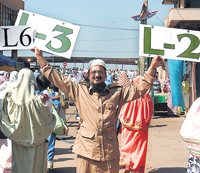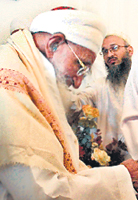
The Bohra Community of Sri Lanka
Introduction
Of the six main Bohra firms in Ceylon, the oldest was that of the Carimjee Jafferjee family. The firm had been in Sri Lanka since 1831 with branches all over India and even extending to Mauritius. The Company exported all types of local produce and imported rice, sugar, flour, pepper, and groceries. The leading Bohra firm of that time, however, was E G Adamaly, owned by the brother, E M Adamaly, G M Adamaly, and A M Alibhoy. It was the largest importer of rice, sugar, flour, matches, keresone and grain, with its import of rice in 1905 amounting to 400,000 bags a year. The firm owned extensive property in Colombo, Kandy, and Nuwara Eliya, includ9ing the 300 acre Fairfield Estate of Rubber and Tea in Avissaewella. With its buggalows, the firm did extensive trade with the Maldives and a barter trade with the Nicobar and other Islands in the Indian Ocean. From 1920 to 1925, a family member, E G Adamaly, was one of the "Indian Members" of the Legislative Council.
The other important Bohra firms were, Hebtulabhoy, Jeevunjee, Noorbhai, Dawoodbhoy, and Moosajee. The Hebtulabhoy family in Sri Lanka goes back to 1864, when a Bohra from Kutch, Sheikh hebtulabhoy, started a business in the Pettah. The firm, called Sheikh Abdulabhoy AbdulAli, was a family business managed by Hebtulabhoy and his sons, dealing in food imports. A few years later, Hebtulabhoy, expanded his business and his two vessels traded in India and the Maldives. He invested in property in India and Sri Lanka, which included premises in the Pettah at Fourth Cross Street, worth Rs 27,000 in 1897, 3 acres of land on Bambalapitiya Road worth Rs. 20,000, 23 acres of coconut land, 18 acres of cinnamon, 5 acres of paddy, and unplanted land. In 1896 he purchased 1/2 acre next to the Wellawatte Railway Station. After the founders death in 1897, his sons continued the business. One son, Moosbhai Hebtulabhoy started his own firm M S H AbdulAli, in 1907. The same year, the three other brothers, MohamedAli, TyebAli and AbdulHussein, started a firm under the name M S Hebtulabhoy, importing food and hardware and exporting local produce, especially concentrating on tea and breaking the monopoly on tea exports (Island Mar 14 1982).
Among Bohra Merchants were A H S Jeevunjee, who had branches in India and the Maldives. This firm exported tea, arecanuts, coconut oil, and other local produce, and imported dried fish, grain, cereals, and flour from India and Burma, including 200,000 bags of rice a year. Another leading importer cum exporter and General Merchant with contacts all over Asia was the firm of T A J Noorbhai, which exported local produce to many parts of the world and was one of the largest importers of grain, textiles, and cotton manufactured garments. Noorbhai, who was decsribed in 1907 as a "liberal supporter of schools and charities, and one of the best known figures in Colombo commercial circles", also owned sailing vessels and pioneered steam ships between Sri lanka and the Maldives; He had also once owned the Wellawatte Spinning & Weaving Mills (Wright, 1907: pp 495-504).
M S Hebtulabhoy AbdulAly was a nother leading importer of rice, curry stuffs and sugar, who had a prosperous trade (started in Colombo by his father and uncle), exporting local produce to Africa, Mauritius, Singapore and HongKong, where he had trading contracts. He was also the owner of tea, rubber, and cinnamon plantations.
Other Bohra merchants and export import traders in Colombo around 1900 were A E S Jeevunjee, a large importer of rice for the planations, M M Ibramjee, Hassanaly Dawoodbhoy, and H M Moosajee (ibid: pp 496 & 502).
A spiritual togetherness
Sunday Times January 28 2007:
With the leader of the Bohra community, Dai-Ul-Mutlaq, Dr. Syedna Mohammad Burhannudin now in Sri Lanka to observe the Ashara Mubaraka period, the Bohras here have opened their homes to their brothers and sisters worldwide
On January 9, this year, one man made a decision that would affect the immediate future of thousands of people all over the world; a decision that would have them packing their bags, shutting down their businesses and booking their tickets – all in preparation to spend 10 days in a foreign, possibly unfamiliar country. Entire communities of Bohras from near and far, numbering in the thousands would, within weeks, be on a plane to Sri Lanka. Finally gathered together, on January 19, they would begin the observance of Ashara Mubaraka.
 |
| A Burhani guard in action |
The Ashara Mubaraka period described as one of the most important and holy events in the Islamic calendar, commemorates the martyrdom of Prophet Mohammad’s grandson, Imam Hussain. Every year the first 10 days of Moharram, (the first month of the Islamic calendar) is spent in mourning, in recognition of Imam Hussain’s sacrifice. After 10 days comes Ashurah, the actual anniversary of his passing in the Battle of Karbala. Meaning, ‘the tenth’, Ashura is a day of voluntary fasting. This year, Ashara Mubaraka began on the 19th, and Ashura will be observed today, January 28th.
At the head of the Dawoodi Bohra community is the 52nd Dai-Ul-Mutlaq, Dr. Syedna Mohammad Burhannudin. Chosen by his predecessor, the current Dai-Ul-Mutlaq is the very heart of the Bohra community. Each year, he picks a city in which to commemorate Ashura Mubarak, be it Houston or Ahmedabad…this year it was Colombo.
“We were all in tears…finally we could see him arriving in our country, stepping onto our soil,” says a media spokesperson for the local Bohra community, explaining that it has been eight years since His Holiness last came here.
When the Dai-Ul-Mutlaq’s decision was made known, Colombo’s 2,500 strong Bohra community immediately swung into action. They knew that ahead of them lay a gargantuan task – they had to prepare to host not only the man they most deeply revered but also the many thousands of faithful believers who would follow him to Sri Lanka.
The local Bohra community
are - as is traditional - exemplary hosts, and have arranged transportation,
accommodation, and food for all their visitors over the entire period of Ashara
Mubaraka at their own expense. Today hotels all across the city, and even up to
Beruwala, are filled with visitors. In addition, the 800 odd Bohra households
scattered across Colombo are on average playing host to 20 people each. A fleet
of buses transports people to and fro, while a train has also been placed at
their service.
“All we say is ‘Come, His Holiness is here, come, and we will provide everything
for you,” explains the spokesperson, adding that “thousands have come from all
parts of the world and thousands more are expected.” This is tradition, but
making this operation smooth and efficient are the wonders of modern technology.
“Everything is computerised, that’s why it’s so easy for us,” explains the
spokesperson. She adds that “even before the announcement, you have to go online
[the Bohras have their own well-organized website] and register that you intend
to come for this year’s Ashara, no matter what country it is in.” Key to the
registration process is the number on the I.D card that all Bohras carry.
Great attention is paid to detail. A temporary table erected at the airport holds a welcoming committee. Arriving Bohra guests are asked to swipe their I.D card through a machine at the airport as soon as they arrive, automatically registering their presence in Sri Lanka in the computer. “Now we know they are in the country – and now that they are here, they are our responsibility,” explains the spokesperson. From the airport transport is arranged to take them to the old passport office near Majestic City, where the organizers have set up offices. Here, they are allocated accommodation and provided transport to their hotels.
Bohras congregate atleast twice every day for prayers at the Bohra Mosque in Adamaly Place, Colombo 4. Approximately 5,000 can be seated in the mosque, and the organisers have extended the seating area further, erecting several tents with speakers adjoining the main building. A comprehensive medical centre, with over a 100 doctors on call is just down the road, while two large sheds on Marine Drive are used at meal times. Teams from all over the world that include cooks and security personnel (known as Burhani guards), work in sync to meet the not inconsiderable needs of the gathering.
Many see the Dai-Ul-Mutlaq’s visit here as a beacon of hope amidst the escalating conflict. “We never expected His Holiness to choose Sri Lanka, because of all the trouble in the country,” says N. Khanvhoy reverently, “but he says there will be peace.”
“Deedar – that what people come for,” says Zoeb Yusuf Ali, explaining that he draws sustenance and inspiration simply from looking upon the countenance of His Holiness. Many feel the same, choosing to go wherever His Holiness decides to observe Ashara Mubaraka. “I have been following him for many years now,” says F. Khilawala. She and her family will stay not only for the required 10 days, but like many others may extend their time here to take in some of the sights and do a little shopping.
Understandably, this annual gathering serves to bind an already close community even closer together. “25 officially, but I have a 100 people coming over for tea every single day,” says a delighted Umme Salama, whose house seems to be a hub of activity. M. Thayabally reveals that he originally knew only one of the 20 people who would be living with him, however, time and proximity has taken care of that. “These are people from all over the world, they unite and get to know people from other parts of the world,” he explains.
In a world where people are cautious about opening the door to strangers, a strong sense of community seems innate to the Bohras. Young children, in sequin laden caps, the women in their colourful two piece ridas decorated with patterns and lace, and the men in their white and gold topis seem to mingle with the ease of long familiarity. Somehow, they seemed to have attained an enviable balance, where tradition blends into modernity, and faith withstands the test of time.
| Who are the Dawoodi Bohras? |
 The
Dawoodi Bohra community has its roots in the west Indian state of
Gujarat and are strong Ismaili Shi‘a belonging to the Fatimid tradition
of Islam. The word Bohra is derived from a word of Gujarati origins,
meaning “to trade” and most Bohras were in fact businessmen, though in
recent years they have spread out to pursue numerous other professions.
Despite being of a number of different nationalities, Bohras all speak
Dawat-ni-zaban – a dialect of Gujarati. The
Dawoodi Bohra community has its roots in the west Indian state of
Gujarat and are strong Ismaili Shi‘a belonging to the Fatimid tradition
of Islam. The word Bohra is derived from a word of Gujarati origins,
meaning “to trade” and most Bohras were in fact businessmen, though in
recent years they have spread out to pursue numerous other professions.
Despite being of a number of different nationalities, Bohras all speak
Dawat-ni-zaban – a dialect of Gujarati.
With an estimated world wide population of nearly a million, the Dawoodi Bohras are reputed to be the best organized and wealthiest of all Muslim communities. The Bohras regard their leader, the Dai-Ul-Mutlaq as their touchstone for guidance in all aspects of life. Interestingly, Bohras consider loyalty to the land they reside as part of their faith. |